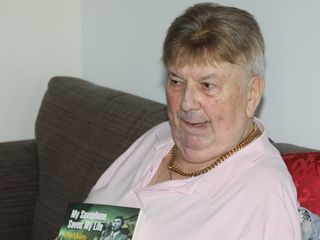Tayto boss founded iconic brand after sampling ‘stale’ English crisps
“You’d get a little sachet of salt, so you’d root into the bag and put the salt on yourself. He used to complain every day that they were stale, but he’d still go back the next day”
John O'Connor of Tayto
If Carlsberg did jobs than John O’Connor, the marketing manager of Tayto, might have to turn it down - because he already has the dream job.
John who celebrated 20 years with one of Ireland’s biggest exports earlier this year admits cheerily: “I have the best job in the world!
“I celebrated 20 years with Tayto earlier this year. I was in Cadbury and Glanbia for nine years each, but this is such a fun place to work, people stay here for longer than most places. We are in business to do business, but the brand is so infectious, and Mr Tayto puts a smile on my face every day.
“We have just released a new book, The Story of Tayto: The Original Irish Crisp, about the famous history of the 70-year bag of crisps and the old pictures and stories are a wonderful read.
“There is a real emotional connection to Tayto and people love reading and talking about its history.
“It’s been a real journey, each person who has owned this business, it has been different ownership right through, but everyone is committed to the brand
“Mr Tayto comes to our sales conference and our Christmas party. He has to rock along to our parties and dance the night away. I often feel sorry for the fella who must be roasting hot in that suit. I still love a bag of Tayto, not every day but I love them.”
Crisp packets in the year 2000
Read more
The new book charts the humble beginnings of the famous Irish crisp back to 1954, when Joe ‘Spud’ Murphy opened a small factory in Dublin city in a two-bed house.
Until then, we imported out crisps from the UK, and Murphy embarked on the business when he saw the gap in the market. The Liberties man — who grew up in the shadow of the Guinness factory — started the company with a budget of £500.
John says: “Joe used to get to same shop in Swords every day to get a packet of English crisps.
“The shop still exists but it’s not in the same spot, it’s called Savages.
“He’d pop into the shop and get a bag of crisps, they were English and they were stale. You’d get a little sachet of salt, so you’d root into the bag and put the salt on yourself. He used to complain every day that they were stale, but he’d still go back the next day.
“Then one day the lady shop keeper, Mrs Savage, had enough of him saying the same thing every single time and told him to ‘go and make your own blazes packet of crisps’, and that’s exactly what he did, and we are still here!!’
John adds: “I remember back in 2009 when Mr Tayto went up for election, it was the most googled word on Ireland during that period, because Mr Tayto really connects with people, it’s brilliant.
“Our biggest export market is Australia, so many of us are down there, and the east coast of America with New York and Boston, but wherever there is an Irish pub anywhere in the world, there will be a packet of Tayto, by hook or by crook we’ll get it there.
“Joe started off with four staff in a two-room building near Moore Street. He used to experiment with tastes and he had a fella called Seamus Burke who was a scientist, who is credited with the cheese and onion flavour, which kind of happened by chance because one day they hadn’t enough cheese so they loaded in the onion and then thought, this tastes pretty good.”
Sligo's Seamus Burke
Scientist Seamus Burke — from Sligo — was the man who created the flavouring and the way to keep the famous crisp fresh.
The cooked crisps were flavoured by hand and then packed into a waxed greaseproof paper bag before being sealed by another one of the company’s first employees, Bernie Kane.
“Cheese and onion remains the number one seller. A massive 60 to 65pc of all sales in Ireland are cheese and onion. Tayto has the balance just right. The UK go for a slightly sweeter taste so that’s why people love cheese and onion,” he says.
■ The Story of Tayto, by Bobby Aherne and published by Sitric Books, is available in bookstores nationwide priced €19.95.











































